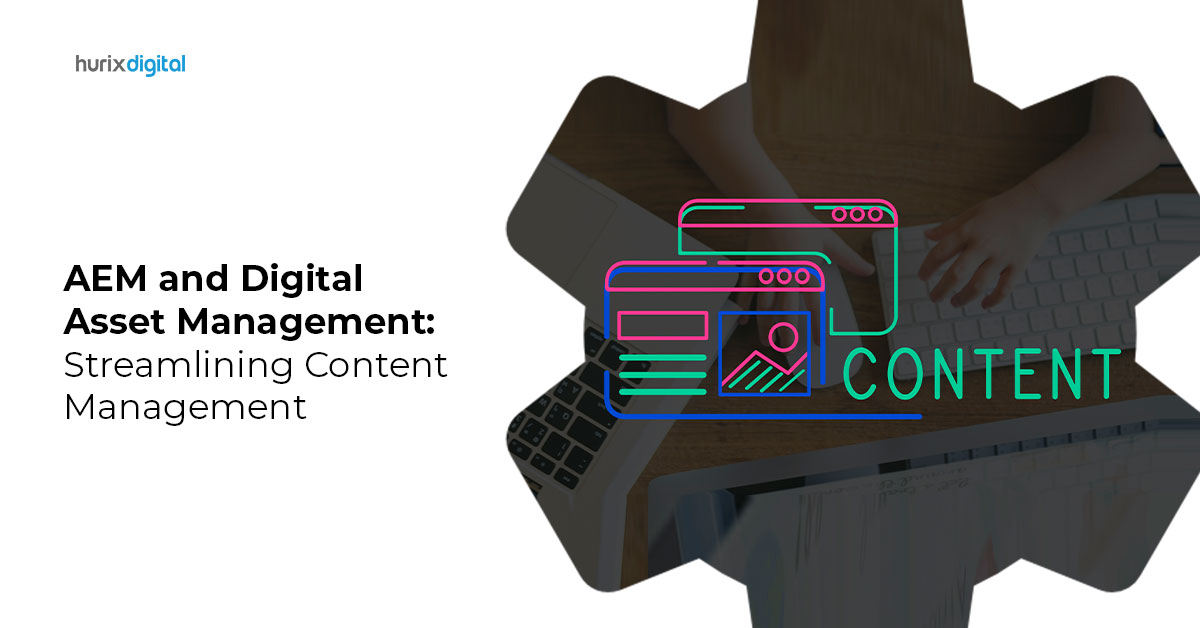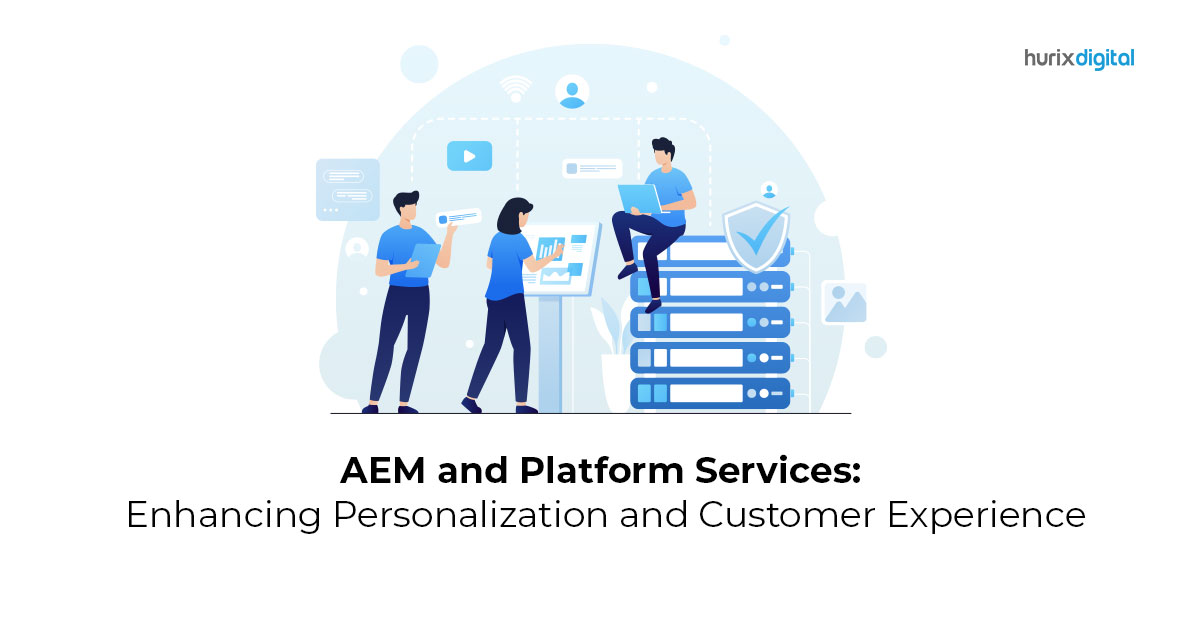
AEM and Digital Asset Management: Streamlining Content Management
With 89% of marketers reporting a positive ROI from using personalization in their campaigns, it has become a key component of every successful digital marketing strategy.
Now more than ever, digital marketers need to produce more original content and make sure that it is consistent across all platforms, including social media, e-commerce websites, and even physical stores. At this point, effective content management becomes crucial. Nevertheless, a lot of businesses require assistance in tracking their digital assets.
This blog post will explore how Adobe Experience Manager (AEM) and its Digital Asset Management systems (DAMs) can streamline the content management process and improve the efficiency and effectiveness of your digital marketing campaigns.
Table of Contents:
- What is Digital Asset Management?
- Why is Digital Asset Management Important?
- What are AEM’s Digital Asset Management Features?
- How Can AEM’s Dam Feature Streamline Content Management?
- Leveraging AEM for Enhanced Personalization
- How AEM Simplifies Localization Efforts
- AEM’s Role in Driving Marketing ROI
- Best Practices for Maximizing AEM’s Potential
- Summing Up
What is Digital Asset Management?
Digital Asset Management (DAM) software manages all digital assets valuable to an organization in a centralized system for easy access. Digital Assets include any file that is valuable to an organization. This could be images, videos, infographics, Adobe InDesign or Photoshop files, and so on.
DAMs manage these assets through their existence, i.e., from the moment they are created to the moment they are archived. However, it’s crucial to remember that all DAMs are not created equal. Standard Digital Asset Management systems store assets in isolated systems, resulting in difficulties for teams in locating, managing, and regulating them. That’s where AEM comes in.
AEM stands for Adobe Experience Manager, a comprehensive Content Management System (CMS) offering various features and benefits for digital marketers.
Why is Digital Asset Management Important?
For any firm, time and resources are valuable. By organizing and managing all digital assets, digital asset management helps businesses operate with remarkable efficiency. This facilitates the rapid and effective distribution of an organization’s digital assets.
The following are some of the main advantages of managing your digital content with a DAM:
-
-
- Organization: To ensure that teams throughout the company have access to the most recent authorized data, a DAM assists in organizing digital content. The user-friendly asset storage mechanism of DAM systems guarantees that no data is lost and that duplicate files are removed.
- Rich Metadata: Brands may monitor their metadata for improved tracking and analysis by using digital asset management technologies. The speed and simplicity of searching through thousands of files is one of DAM’s primary advantages.
- Preserve Consistency and Brand Integrity: All digital assets and marketing materials will be uniform, current, and on-brand thanks to the unified DAM system. Any utilization of out-of-date or subpar digital content is therefore eliminated.
-
Also Read: AEM Cloud Service: Benefits, Migration, and Best Practices
What are AEM’s Digital Asset Management Features?
AEM is a powerful digital asset management platform that integrates with Adobe Creative Cloud and other Adobe products to provide a seamless and holistic solution for digital content management. AEM content management offers several features and functionalities that simplify the DAM process:
1. Asset Checkout
The asset checkout feature locks an asset in place so that only one person can edit, annotate, and publish it at a time. This feature prevents other users from making changes to the asset while they are working on it, preventing overwrites and loss of effort.
2. Asset Collections
AEM includes an asset collection feature that allows users to group assets, making them easier to find in the long run. Collections are groups of assets that can be created based on any criteria a specific user prefers, such as asset type, date created, or project name. AEM also allows users to share collections with other users so that the assets in the collection can be accessed.
3. Asset Insights
The Asset Insights features provide users with critical data on how specific assets perform. This data can help users identify which assets are most popular, where the assets are being used, and how the assets are performing in different situations. Together, this data can be highly beneficial in optimizing asset usage to create more effective marketing campaigns.
4. Brand Portal
The brand portal is a self-service portal that allows users to collaborate with external teams and partners by sharing assets. AEM gives users complete control over how assets are shared. It does this by providing users the ability to control access and the ability to manipulate each asset granularly. This is a useful feature that allows users to easily share digital assets without fear of vital digital assets being misused.
5. Digital Asset Management Workflows
The workflow feature of the AEM Content Management System enables users to automate the asset management process. Users may save time and guarantee consistent management of all digital assets by creating workflows for planning, designing, evaluating, approving, and publishing assets.
6. Digital Rights Management
Digital Rights Management is the most useful feature of the AEM Content Management system. The DRM feature gives users control to decide how each asset is used by specifying who can access them, how they can use them, and when their access expires. This feature is critical in protecting an organization’s intellectual property.
7. Version History
The Version History feature tracks every change that is made to an asset. This allows users to revert to a previous version of an asset if necessary. It also helps you track the progress of edits on an asset and ensure that you are working on the most current version.
How Can AEM’s Dam Feature Streamline Content Management?
Now that you have a better understanding of AEM’s Digital Asset Management features, you will be able to appreciate how it streamlines content management.
-
-
- Centralized and Structured Storage of Digital Assets: AEM’s Digital Asset Management Platform enables organizations to centralize and organize their digital assets. Asset collections can easily be retrieved and shared quickly, saving everyone involved considerable time and effort.
- Streamlined Workflow Automation: AEM allows users to create a customizable workflow that can eliminate all manual intervention, thus reducing bottlenecks and allowing all focus to be on creativity and getting the job done.
- Collaborate and Share Assets Securely: Collaboration is key to working effectively today, between multiple teams within an organization or between organizations. The brand portal, combined with AEM’s digital rights management, allows users to collaborate seamlessly without the fear of any risk to intellectual property.
-
AEM can be a powerful tool in any industry, such as healthcare, gaming, and e-commerce, and is especially useful for Digital Marketers who often deal with substantial amounts of digital assets.
Leveraging AEM for Enhanced Personalization
By combining smoothly with other Adobe solutions, companies can achieve new degrees of customization thanks to AEM’s sophisticated Digital Asset Management features.
AEM improves the distribution of individualized content as follows:
1. Dynamic Content Creation and Delivery
AEM lets companies construct modular content chunks that could be dynamically assembled based on user preferences and behavior. A retail website might utilize AEM, for example, to show tailored product recommendations based on a user’s location, browsing behavior, or past purchases.
2. Real-Time Adaptability
Through integration with Adobe Analytics, AEM helps marketers monitor user interactions in real time and dynamically modify content distribution. This guarantees that consumers view the most pertinent information at the correct moment, improving user involvement and conversion rates.
3. Scalable Personalization Across Channels
AEM offers omnichannel content distribution, therefore guaranteeing consistency across websites, mobile apps, emails, and even physical touchpoints like kiosks. Companies can keep a consistent brand voice while customizing materials to particular channels and audience segments.
How AEM Simplifies Localization Efforts
Managing content across several countries and languages presents difficulties for global companies.
AEM tackles this with strong localization tools:
-
-
- Integrated Translation Tools: AEM allows for automation of the localization process through integration with translation services. This guarantees consistency in messages across languages and speedier turn-around times.
- Localized Content Management: Marketers can readily oversee localized versions of digital materials housed inside AEM. Version control on the platform and metadata tagging help one easily find which materials belong to particular areas or campaigns.
- Automated Workflows for Localization: AEM reduces the manual labor needed to update content over several geographies by automating localization processes. While the platform manages operational chores, teams can concentrate on creating culturally relevant advertising.
-
AEM’s Role in Driving Marketing ROI
AEM immediately affects a company’s marketing return on investment by simplifying content management and distribution.
Here’s how:
-
-
- Reduced Time-To-Market: Automated systems and centralized asset management greatly cut the time needed to start initiatives. Faster implementation lets companies keep ahead of rivals and profit from market developments.
- Improved Asset Utilization: Advanced search tools and metadata tagging help AEM make sure teams may rapidly find and use current materials. This minimizes unnecessary work and best uses available resources.
- Enhanced Campaign Performance: AEM’s integration with Adobe Analytics and Adobe Target provides a practical understanding of campaign results. Data-driven decisions made by marketers help raise general campaign effectiveness, engagement, and conversion rates.
-
Best Practices for Maximizing AEM’s Potential
To fully utilize the Digital Asset Management features of AEM, businesses should adhere to the following best practices:
-
-
- Invest in Metadata Standards: A well-defined metadata strategy ensures simple searching and categorization of items. Teams should work together to establish an organizational need-aligned taxonomy.
- Regular Asset Audits: Frequent asset audits of the DAM repository help preserve efficiency through evaluation and cleanup. To simplify processes, duplicate, obsolete, or unneeded assets should be archived or destroyed.
- Continuous Training: Teams should constantly be learning to be updated on AEM’s features. This guarantees that everyone can make good use of the platform and seize any added functionality.
- Leverage AI for Content Automation: AEM’s AI-powered content automation tools—auto-tagging and smart cropping—can save a lot of time and work. Companies should consider how these tools could improve content production and administration.
- Integrate with Other Tools: AEM’s real strength resides in its integration capacity. For a seamless workflow, companies should link AEM with other tools in their IT stack, including e-commerce platforms, CRM systems, and Adobe Creative Cloud.
-
Check out this Exclusive Press Release: Hurix Digital Joins Adobe Bronze Solution Partnership Program to Enhance AEM Consulting Services
Summing Up
AEM content management features provide a comprehensive CMS Platform for streamlining content management. The importance of digital asset management in today’s personalized, content-driven, omnichannel digital marketing strategies cannot be overstated. AEM Content Management is just the tool you need to streamline the Content Delivery Process.
Transform your online experiences with Hurix Digital’s AEM Services. Create, oversee, and distribute engaging content effortlessly with Adobe Experience Manager’s advanced DAM features.
Our expertise and extensive experience ensure a seamless implementation of AEM, enabling organizations to streamline their content management processes. Feel free to reach out to our team if you’d like to explore more about how AEM can support your goals.

SVP & Head – Hurix Technology Solutions
Global Delivery head with 25 years of working experience in NYC investment banks and fintech companies. Hands-on technology delivery management and program management, accountable for stakeholder relationships, Strategic roadmap, P&L, Revenue growth, Account Management, and employee satisfaction.







